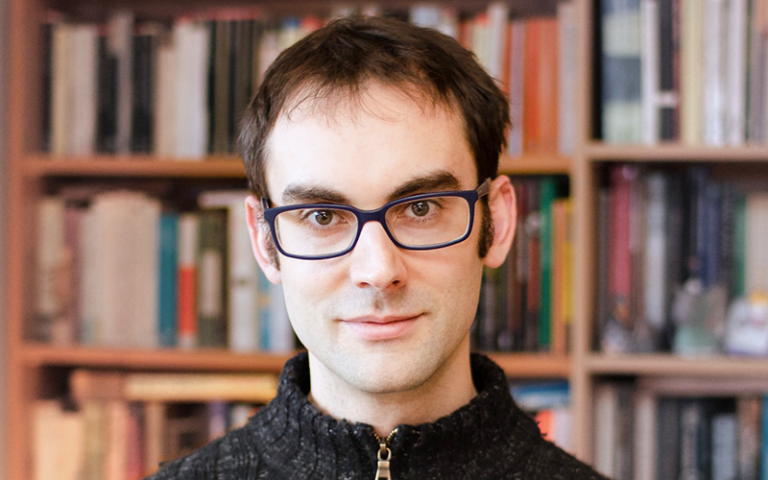Spotlight on... Professor Andrew Pontzen
13 July 2023
This week we meet Andrew Pontzen, Professor of Cosmology at the UCL department of Physics and Astronomy. Here he chats to us about visiting a remote part of the Grizedale Forest and his new book, The Universe in a Box...

What is your role and what does it involve?
I’m a Professor of Cosmology at the Department of Physics and Astronomy. I’m also co-director of the Cosmoparticle Initiative, which builds bridges between cosmologists, high energy physicists, quantum physicists and space scientists – we often speak surprisingly different languages!
Most of my time is spent overseeing students and postdocs on various research projects: understanding the way that galaxies form and evolve, understanding what dark matter is, and using laboratory experiments to better understand quantum aspects of the early universe. I teach postgraduate-level cosmology. And, finally, I enjoy engaging with the public through a variety of projects – both in person and through the media, and sit on the Royal Society’s Public Engagement Committee.
How long have you been at UCL and what was your previous role?
I’ve been at UCL since 2013. Before that I held junior research fellowships in at the universities of Oxford and Cambridge.
What working achievement or initiative are you most proud of?
The Cosmoparticle Initiative that I built with Hiranya Peiris starting in 2016. As I said before, it’s all about building links between academics, postdocs and students in different disciplines, and it’s now been acknowledged in 145 publications and contributed to securing a diverse range of grants totalling £16M. But these numbers don’t convey what I am most proud of, which is an environment emphasising the essentially collaborative and joyous nature of research. We’ve organised a number of academic workshops. Then, a few years ago, we travelled to a remote part of the Grizedale Forest to try innovative outreach ideas in a setting where nobody would expect to encounter physicists. And we set up various support systems for students, like peer learning – regular sessions where everyone gets together and talks about important but often-overlooked skills, ranging from data processing through to time management and building supportive professional networks.
Tell us about a project you are working on now which is top of your to-do list
Over the summer I am working hard to promote my literary non-fiction book, The Universe in a Box, which was published in June by Jonathan Cape. It’s a book all about cooperation — how everything from quantum particles to black holes work together to produce the incredible, complex, evolving universe. But it's also about cooperation between people, and how 21st century technology is changing humanity’s conception of our origins, of science and of reality itself. And of course, it features a lot of the work we’ve been doing at UCL over the last few years.
What is your favourite album, film and novel?
I’m not sure I really have favourites like that, so I just have to pick some examples. My parents were both professional musicians and I acquired some pretty eclectic tastes. In recent years one of the real stand-out British recording artists has been Jacob Collier, who seems to have a command of every aspect of music theory, and uses it to weave genre-defying original and cover tracks; try Djesse Volume 1. I enjoy most films by Christopher Nolan and am looking forward to seeing Oppenheimer. (Am I contractually obliged to say that, since Nolan is a UCL alumnus and I am a physicist?) Novel-wise, recently I enjoyed Tomorrow, and Tomorrow, and Tomorrow by Gabrielle Zevin.
What is your favourite joke (pre-watershed)?
Did you hear about the magic tractor? It went down the road and turned into a field.
Who would be your dream dinner guests?
If I am allowed to bring people back from the dead, I think I’d invite Beatrice Tinsley. She kick-started the entire field of computational galaxy formation during her PhD in the late 1960s, but struggled for recognition from her own institution, even as she became internationally renowned. She died tragically young in 1981, and so today many researchers haven’t even heard of her. Senior academics in the field still remember her, of course – and they have puzzlingly differing accounts of what she was like. As I was researching my book, I became absolutely absorbed in her story; she is a truly fascinating figure who I’d like to meet for myself.
What advice would you give your younger self?
Be patient with life. Listen carefully to criticism.
What would it surprise people to know about you?
When I was an undergraduate, I was part of an improvised comedy troupe. We went to the Edinburgh Festival Fringe with a show called Out Of Your Mind, where we pretended to psychoanalyse the audience. In many ways it was the epitome of a cliched student show, but to our astonishment we ended up being reviewed by The Guardian. After a preamble about enjoying the overwhelming volume of rubbishy student shows at the Fringe, the reviewer said we were “actually, properly, non-ironically great”. It was very heartening, although in truth he probably caught us on a lucky night.
What is your favourite place?
Any ruined castle, preferably overlooking the sea, on a warm summer’s evening with swallows darting.
 Close
Close

